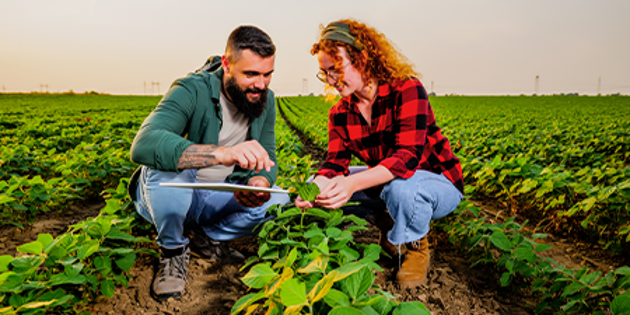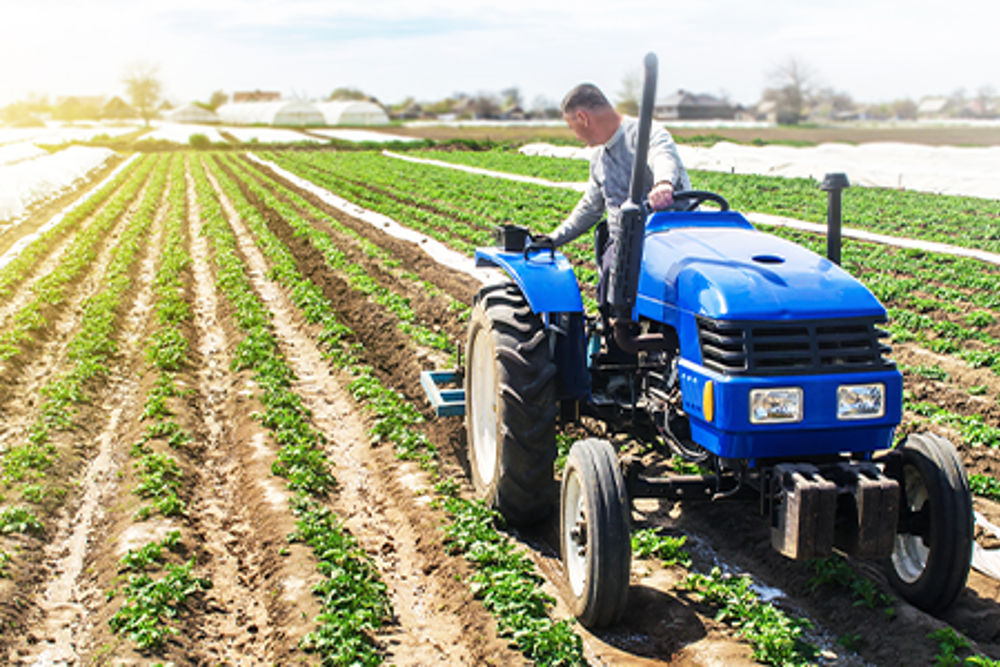Why study agriculture?


In this article, we will take a look at exactly what agriculture studies are, what you will learn at TAFE, the skills you will develop and where those skills could take you in the future.
What are agriculture studies?
By studying agriculture, you will develop skills and knowledge in farming, crop science and using natural resources. These skills are not just applicable in ‘traditional’ farming, but can be applied in aquaculture, horticulture, forestry, floristry and crop science. Specifically, agriculture studies are diverse, with topics covered ranging from developing farm plans to pasture production, managing livestock, operating and maintaining agricultural equipment and also managing staff and everything you need to run a successful business in the industry.
What will you learn?
The skills you will learn studying with South West TAFE are extremely varied and highly valuable for a career in the agriculture industry - from operating and maintaining agricultural equipment, to handling livestock, milking, costing projects and sampling soils. We offer development in a range of skills, and learning can be completed either on campus alongside industry experts or during a traineeships.
Agriculture courses
Certificate II in Agriculture (AHC20122)
This is an introductory-level agriculture course, which is well suited to people who are interested in a career in agriculture. This course will provide the key skills necessary to work in the agriculture industry, and give you the foundation to confidently work on a farm. Specific skills include operating and maintaining equipment (quad bikes, tractors), managing livestock, milking, fencing and first aid. The part-time course is on campus, and runs over 12 months.
Upon successful completion of the course, you could have immediate career opportunities as an assistant farm or station hand, a farm worker or you may opt to continue further study with a Certificate III In Agriculture.
Certificate III in Agriculture (ACH30122)
A Certificate III in Agriculture will give you the skills and know-how to work both independently or as part of a team, doing a mix of practical tasks with equipment, plants and animals. You will obtain workplace-ready experience in operating machinery, animal handling, first aid and establishing pastures and crops for livestock. You will also complete a chemical users course and learn how to deal with the unexpected scenarios that farm-life can throw at you. This course is a two-year, part-time course on campus.
Certificate IV in Agriculture (ACH40122)
This qualification helps you develop the skills and knowledge to become a specialist within the industry. From the start, it is designed to help you become a supervisor or team leader. You will learn how to take responsibility for the quality of the work of others, as well as how to communicate and provide solutions to a range of both predictable and unpredictable problems. Specifically covered will be health, welfare and supervision of staff and managing stock nutrition breeding.
This course will set you up for roles such as a farm team leader, farm supervisor, farm manager or farm consultant. It is an on-campus course that’s held part-time over two years.
Why would I study agriculture?
Studying agriculture sets you up for a future in which you can feed the nation and the world - as well as solving some of the most challenging and important problems of our time. From food security to crop and livestock management, there are many worthwhile areas to learn and contribute to. Secondly, agriculture offers strong job security as often, in many regions, there are more jobs available than applicants to fill them.
Specifically, you might want to study agriculture for the following reasons:
- Food security - As the climate changes and becomes more extreme, the knock-on effect is that some food producing regions become unstable. Food security is all about making sure production remains stable, and to ultimately avoid starvation and conflict.
- Economic development - Agriculture is a driving force of the global economy. Not only can it help to reduce poverty and improve standards of living across the world, it is often one of the only viable industries in some of the poorest regions of the world.
- Sustainability - Sustainability and agriculture go hand-in-hand. Improvements made to sustainability within agriculture are some of the most important sustainability innovations across the world.
- Innovation and technology - Agriculture has been a hotbed of innovation for years. From early innovations in crop-rotation to much more modern ones like drones, autonomous tractors and vertical farming, agriculture is one of the most innovative industries on the planet.
- Rural development - Agriculture generally funnels money into rural communities, and can help to enrich life and develop projects in rural areas.
- Climate change mitigation - One of the most impacted industries by climate change is agriculture, and therefore technologies and techniques to mitigate the impact of climate change are constantly being explored.
- Biodiversity conservation - The environment thrives when biodiversity is prioritised. As someone in the agricultural industry, you can champion biodiversity, employ conservation techniques while farming and make a real difference to the local environment.
- Policy and governance - Food is important, and thus is a very important part of government policy. Within the industry you can be at the forefront of advising on policy.
- Health and nutrition - The industry knows food. As an expert within agriculture, you are well placed to understand nutrition and the importance of food for general health.
Where can agricultural studies take you?
Once you’ve completed your agricultural studies diploma, you are on track to either undertake further study or enter into these careers:
- Plant sciences - Commonly known as botany - this is a path with as many opportunities as there are plants - you could end up working as a botanist, ecologist or a biosecurity officer. Generally, you will have specialist knowledge on plant genetics, land management or crop production techniques.
- Animal sciences - Animal sciences are another extremely varied option - you might opt for rewarding careers in animal protection or health studies, or if you decide to specialise in livestock you could focus on animal nutrition, pasture consulting or livestock management.
- Food sciences - Food science is another specialist area - and you will ultimately work on problems that shape the future of the world. On one hand, you might focus on nutrition and how economics determines the quality and quantity of food we eat. While with another focus, you might explore how to overcome barriers to food scarcity in deprived regions.
- Sustainable agriculture - If you choose to specialise in sustainable agriculture, you can make a real difference in the future of farming. This is a wide, innovative field and the opportunities available within this sub-speciality are huge.
- Agroecology - Agroecology is a specialised field in which natural ecological processes are managed and ultimately used to improve the efficiency and sustainability of farmland. This is an exciting, important area which is focused on understanding interactions between animals, plants and the natural habitat and then employing techniques which can harness those relationships in a positive, sustainable manner for agricultural purposes.
What salary options could you expect?
There are a range of different salary options you might be able to expect, depending on the specific role and seniority. Some examples from Australia are:
- Agricultural Consultant $70k-80k
- Farm Manager $85k-105k
- Soil Scientist $110k - $120k
- Fish Farm Manager $73k
- Agricultural Inspector $95k
- Horticulturist $65k - 75k
- Farmer $75k - 80k
While these are some averages you might expect - if you become an expert or extremely senior within your chosen field, you could certainly look to be earning above these averages.
Agriculture is a growing industry which is depended on for food security, world trade, and survival. Studying agriculture opens up a world of opportunities to be part of this diverse industry. Whether you want to work with plants or animals or in research, the industry always needs more specialists in agriculture. In this article, we have explained why studying agriculture is important, courses available, the types of careers you can have from agricultural studies and salary expectations. For further information, contact the team at South West TAFE.